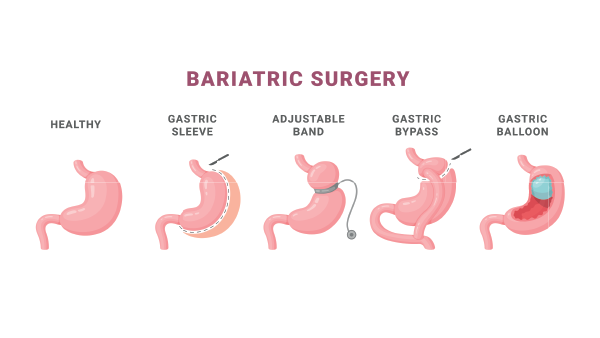
Obesity is a complex, chronic disorder that significantly contributes to the development of various non-communicable diseases such as heart disease, diabetes, and hypertension. India, with one of the fastest-growing obesity rates, is home to around 350 million people suffering from obesity. This surge can be largely attributed to consuming a diet rich in saturated fats, refined sugars, preservatives, and a lack of exercise.
Obesity rates In 2022, India's obesity rate was 9.8% for women and 5.4% for men. This is up from 1.2% for women and 0.5% for men in 1990.
As per 2019 data, there has been a noticeable rise in the number of bariatric surgery procedures performed in India, as many individuals seek therapies to prevent severe health consequences associated with obesity. In this blog post, we will explore the safety, benefits, and risks of bariatric procedures to help determine if it's the right choice for your health.
Obesity-Related Complications and Their Impact
Obesity contributes to non-communicable diseases like cardiovascular diseases, joint disorders, and sleep apnea. It also imposes a significant economic and psychological burden, affecting mental health and quality of life.
Synopsis
- What Is Bariatric Surgery?
- Eligibility to Undergo Bariatric Surgery
- Types of Bariatric Surgery
- Pre-Surgery Preparations
- Post-Surgery Lifestyle Changes
- Psychological Aspects of Bariatric Surgery
- Advanced Technologies in Bariatric Surgery
- Risks and Myths of Bariatric Surgery
- Alternatives to Bariatric Surgery
- What Are the Side Effects of Bariatric Surgery?
- Long-Term Outcomes of Bariatric Surgery
- Role of Multidisciplinary Care Teams
- Conclusion
What Is Bariatric Surgery?

Bariatric surgery, also called weight loss surgery, is a surgical procedure designed to help individuals with obesity manage or lose weight to improve their overall health. It alters the digestive tract in such a way that it reduces food consumption, absorption, and appetite, creating a feeling of fullness. These procedures provide more reliable and sustained fat loss than traditional diet, exercise, and medications.
Eligibility to Undergo Bariatric Surgery
To be eligible for bariatric surgery, you must meet the following criteria:
-
A body mass index (BMI) of 40 or above
-
A BMI of 35 to 39.9 with serious obesity-related health problems like type 2 diabetes, high blood pressure, or severe apnea.
-
In some cases, a BMI of 30 to 34 with a serious obesity-related health problem.
However, not everyone meeting the eligibility criteria can undergo weight loss surgery. They must undergo extensive screening procedures and be willing to make permanent changes to lead a healthier lifestyle post-surgery.
Consult our general surgeon in Patiala if you need to undergo bariatric surgery for weight loss.
Types of Bariatric Surgery

The International Federation for the Surgery of Obesity (IFSO) recognizes five standard procedures:
-
Laparoscopic Sleeve Gastrectomy: The size of the stomach is significantly reduced with staples, resembling a banana, significantly restricting food intake.
-
Laparoscopic Roux-En-Y Gastric Bypass: A three-step procedure that divides the stomach to create a small pouch and reroutes the intestine to bypass a major portion of the digestive system, decreasing calorie absorption.
-
Laparoscopic Adjustable Gastric Banding: A ring with an inflatable balloon is placed in the upper portion of the stomach, creating a small pouch that restricts calorie intake.
-
Biliopancreatic Diversion with Duodenal Switch: Similar to sleeve gastrectomy, but the intestine is partitioned into two tracts; the food passes through one tract bypassing most parts of the small intestine, leading to fewer calories and nutrients absorbed.
-
Laparoscopic Mini-Gastric Bypass: A new tube-like stomach is formed and attached to the intestine by bypassing 2 to 7 feet of its length, limiting calorie intake and nutrient absorption.
Pre-Surgery Preparations
Importance of Pre-Surgery Preparations
-
Crucial for the success of bariatric surgery.
-
Helps in reducing surgical risks and improving recovery outcomes.
Components of Pre-Surgery Preparations
1. Pre-Surgery Diet and Lifestyle Changes
-
Adopt a healthy diet to reduce liver size and improve surgical safety.
-
Increase physical activity to enhance overall fitness and surgical outcomes.
2. Physical Exams
-
Comprehensive medical evaluation to assess overall health.
-
Tests may include blood work, imaging studies, and cardiac evaluations.
3. Psychological Assessments
- Evaluate mental readiness and identify any psychological issues.
-
Address potential eating disorders, depression, or anxiety.
4. Nutritional Counseling
-
Guidance on dietary changes is needed before and after surgery.
-
Education on portion control, nutrient-dense foods, and hydration
Post-Surgery Lifestyle Changes
Commitment to Lifelong Changes
-
Essential for maintaining the benefits of bariatric surgery.
-
Involves continuous adherence to dietary and exercise recommendations.
Components of Post-Surgery Lifestyle Changes
1. Diet Plan
-
Follow a structured diet plan to ensure adequate nutrition.
-
Focus on high-protein, low-sugar, and low-fat foods.
-
Gradual progression from liquid to solid foods.
2. Managing Nutritional Deficiencies
-
Regular intake of prescribed vitamins and minerals.
-
Monitor for deficiencies in iron, calcium, vitamin B12, and others.
3. Exercise Routine
-
Incorporate regular physical activity to aid weight loss and improve fitness.
-
Start with low-impact exercises and gradually increase intensity.
Psychological Aspects of Bariatric Surgery
Emotional Challenges
-
Patients may experience body image concerns, food addiction, or emotional eating.
-
Psychological support is crucial for addressing these issues.
Support Systems
1. Counselling
-
Professional counselling to help cope with emotional changes.
-
Address issues like self-esteem, depression, and anxiety.
2. Support Groups
-
Join support groups for shared experiences and encouragement.
-
Provides a platform for discussing challenges and successes.
Advanced Technologies in Bariatric Surgery
Technological Advancements
-
Innovations like robotic-assisted surgery and AI-enabled planning enhance precision and outcomes.
Benefits of Advanced Techniques
1. Robotic-Assisted Surgery
-
Greater precision and control during surgery.
-
Reduced risk of complications and faster recovery times.
2. AI-Enabled Pre-Surgery Planning
-
Improved surgical planning and personalized treatment strategies.
-
Enhanced prediction of surgical outcomes and potential risks.
Risks and Myths of Bariatric Surgery
|
Risks |
Description |
|
Short-Term Risks |
|
|
Bleeding |
Can occur during or after surgery, requiring medical intervention. |
|
Leaks |
Potential for leaks at the surgical site, which can be life-threatening if not managed promptly. |
|
Long-Term Risks |
|
|
Dumping Syndrome |
Rapid passage of food through the digestive tract, causing nausea, fatigue, and diarrhoea. |
|
Kidney Stones |
Changes in nutrient absorption can increase the risk of kidney stones. |
|
Weight Regain |
Possibility of not losing the desired weight or regaining weight post-procedure. |
|
Nutritional Deficiency |
Reduced food absorption may lead to deficiencies in essential nutrients. |
|
Myths |
Description |
|
Bariatric Surgery is a Shortcut to Weight Loss |
Surgery is a tool, not a quick fix; requires lifestyle changes for success. |
|
"It Eliminates the Need for Diet and Exercise" |
Ongoing commitment to healthy eating and physical activity is essential. |
Alternatives to Bariatric Surgery
Alternative weight loss options like medical weight loss programs, prescription medications, and non-surgical procedures like endoscopic sleeve gastroplasty can be considered. These alternatives vary in effectiveness and risks compared to bariatric surgery.
What Are the Side Effects of Bariatric Surgery?
Bariatric surgery side effects are minimal in comparison to the complications arising from obesity. Short-term bariatric surgery risks experienced by patients include bleeding and leaks, which have the potential to turn life-threatening if not managed. Long-term bariatric surgery complications may include:
-
Dumping syndrome: Develops when food passes too quickly through the digestive tract, causing nausea, fatigue, and diarrhoea
-
Kidney stones: Changes in nutrient absorption increase your risk of kidney stones
-
Weight regain: You may not lose the desired weight or regain weight post-procedure
-
Nutritional deficiency: Limitation in food absorption may lead to nutrition deficiency
Among all the Bariatric Procedures, the side effects of Gastric Bypass Surgery are more pronounced, including malnutrition and gastrointestinal complications.
Consult our general surgery hospital in Patiala if you need to more about bariatric surgery side effects.
Long-Term Outcomes of Bariatric Surgery
Studies highlight long-term benefits like sustained weight loss, reduced risk of diabetes, and improved life expectancy. Avoiding long-term risks like weight regain or malnutrition is crucial.
Role of Multidisciplinary Care Teams
The collaborative role of surgeons, dietitians, psychologists, and physiotherapists ensures the success of bariatric surgery. Integrated care at hospitals like Manipal provides comprehensive support to patients.
Conclusion
Including statistics and references to studies significantly enhances the credibility of discussions on obesity and bariatric surgery. For instance, obesity in India has reached epidemic proportions, with nearly one in every four individuals being overweight. This alarming statistic underscores the urgency of addressing obesity-related health issues.
Additionally, referencing authoritative sources such as the National Family Health Survey (NFHS-5) and the World Health Organization (WHO) provides a solid evidence-based foundation for the information presented. This approach not only strengthens the argument but also builds trust with the audience, as they can verify the data and understand the scientific basis of the claims made. By grounding the narrative in well-documented statistics and credible studies, the blog becomes a more compelling and trustworthy resource for readers seeking reliable information.
For a committed patient, Weight Loss Surgery is an effective tool for losing weight and reducing the impact of obesity-related complications. But it’s important to know that these surgeries have the same risks as any other surgery; therefore, you must have reasonable expectations of what your life will be after surgery. If you are considering Weight Loss Surgery, visit our expert bariatric surgeons at Manipal Hospitals, Patiala, to explore your options.
FAQ's
Your surgeon will put you on a special diet 2 to 3 weeks prior to the surgery. This is done to shrink your liver and reduce abdominal fat to make Bariatric Surgery as safe as possible.
After Weight Loss Surgery, most patients take one to two weeks to return to their normal routine or desk jobs. Those involved in jobs requiring heavy labour may take longer.
Since you are at higher risk of developing nutritional deficiency following some Bariatric Surgery, it is recommended that you take some vitamin and mineral supplements, especially iron, calcium, and vitamin D.
It is advised to wait for 12 to 18 months to get pregnant after surgery. Since you will have changes in menstruation due to fluctuating weight, you can become pregnant when you least expect it. Use contraception, preferably IUD, condoms, or spermicide, as birth control pills may not be effective.
To schedule an appointment at Manipal Hospitals, Patiala, contact or visit our website.



















 6 Min Read
6 Min Read













